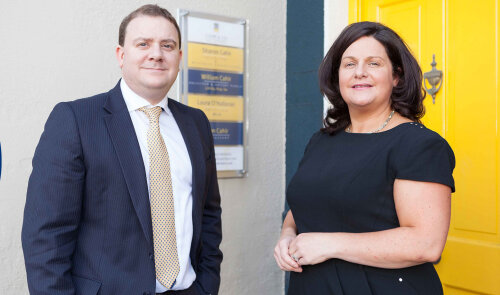Best Divorce & Separation Lawyers in Ennis
Share your needs with us, get contacted by law firms.
Free. Takes 2 min.
Free Guide to Hiring a Family Lawyer
List of the best lawyers in Ennis, Ireland
About Divorce & Separation Law in Ennis, Ireland
This guide explains the basic legal framework for divorce and separation for people living in Ennis, County Clare. Divorce and judicial separation in Ireland are governed by national family law and are dealt with by the Circuit Court and the High Court. Although the underlying law is the same across Ireland, there are local practical features to be aware of - for example where to file court forms, local family support services, and nearby mediation providers in County Clare.
Divorce ends a marriage and allows either former spouse to remarry. Judicial separation does not end the marriage but allows the court to make orders about custody, access, maintenance and the division of certain assets. Both processes can be contested or by agreement, and both may involve issues such as child arrangements, finances, pensions and property.
Why You May Need a Lawyer
Family law matters can affect your home, your finances and your children. A lawyer can help you understand your rights, prepare and file legal documents, negotiate on your behalf, and represent you in court if needed. Common situations where legal help is useful include:
- You and your partner cannot agree on who keeps the family home, how to split savings and pensions, or how to divide debts.
- You need clear, enforceable arrangements for children - this includes custody, guardianship, residence and access rights.
- There are allegations of domestic abuse or safety concerns that require protective orders or emergency court action.
- You or your spouse live or have assets outside Ireland, creating complex jurisdictional and enforcement questions.
- You are unsure whether you should seek judicial separation or divorce, or how long a separation must last before you can apply for divorce.
- You need help applying for legal aid, or you want independent legal advice on a separation agreement or consent order before signing.
Local Laws Overview
Key points about family law in Ireland that are particularly relevant to people in Ennis and County Clare:
- Legal framework: Divorce and judicial separation are regulated by national legislation and court practice. The courts require proof of an irretrievable breakdown of the marriage for a divorce application, and they will only grant a divorce when statutory criteria are met.
- Separation period: In most cases a court will expect that the spouses have lived apart for a specified period as evidence of breakdown - commonly two of the previous three years. The court must also be satisfied that there is no reasonable prospect of reconciliation and that proper provision has been or will be made for spouses and any children.
- Court powers: Irish family courts can make orders about custody and access, guardianship, child maintenance, spousal maintenance, property adjustment and the division of assets. Courts can also make protective orders in cases of domestic violence or threat.
- Jurisdiction: To issue proceedings in Ireland, the court must have jurisdiction. Jurisdiction questions can arise if one or both spouses live abroad or have significant foreign assets. If jurisdiction is uncertain, get early advice from a solicitor who deals with cross-border family law.
- Judicial separation: Judicial separation gives a formal court order setting out financial and child care arrangements while the marriage remains legally intact. It is often used where the parties do not wish to divorce or where divorce is not immediately possible.
- Non-married couples: If you are cohabiting rather than married, different rules apply. The rights of cohabitants are governed by separate legislation and are not the same as the rights of married spouses.
- Local matters: Family law hearings in County Clare are generally handled through the Ennis court system. Many disputes are resolved by agreement or through mediation rather than a contested court hearing, so local mediation and family support services can be important first steps.
Frequently Asked Questions
What is the difference between separation, judicial separation and divorce?
Separation usually means the partners are living apart and have agreed to separate, either informally or by a written agreement. Judicial separation is a court order that recognises the separation and can deal with finances, maintenance and arrangements for children while the marriage remains legally intact. Divorce is a court order that legally ends the marriage and permits either former spouse to remarry.
How long does it take to get a divorce in Ireland?
Timeframes vary widely depending on whether the divorce is by agreement, whether there are complex financial or child care issues, and how busy the courts are. Simple, uncontested cases can be resolved within several months once all documents are in order. Contested cases or cases with complex asset division or jurisdiction issues can take much longer - often a year or more. You must also meet any statutory separation period required by the court before applying.
Do I need to have been separated for a certain period before applying for divorce?
The court will expect evidence that the marriage has broken down irretrievably. This typically includes a period of living apart - commonly two of the previous three years. There are exceptions in rare circumstances, but you should get specific legal advice about your circumstances.
Who looks after the children after divorce or separation?
The best interests of the child are the primary consideration for Irish courts. Parents can make agreements about custody, residence and access, and courts will usually approve parenting plans that protect the child. If parents cannot agree, the court will make orders about guardianship, primary residence and access. The court may also make arrangements for child maintenance.
How are pensions, savings and the family home divided?
Courts can make property adjustment orders and other financial orders to achieve a fair division of assets, taking into account factors such as contributions by each spouse, the financial needs of each spouse, and the welfare of any children. Pensions and long-term investments often require specialist valuation and legal advice. Reaching a negotiated settlement - with legal advice - is commonly quicker and less costly than a contested court process.
Can I get legal aid for a separation or divorce in Ennis?
Legal aid may be available for family law cases where you meet financial eligibility criteria and the matter falls within the scope of the Legal Aid Board. Even if full legal aid is not available, there may be other supports such as free initial advice clinics, duty solicitor schemes at court, and community legal services. Check eligibility early so you can plan your next steps.
What is mediation and should I consider it?
Mediation is a voluntary process where an independent mediator helps both parties reach agreement on issues such as child arrangements and finances. Mediation can be faster, less adversarial and less expensive than court proceedings. It is particularly useful where both parties are willing to negotiate and prioritise a practical settlement. A solicitor can advise whether mediation is suitable for your case.
What immediate steps should I take if there is domestic abuse or safety concerns?
If you or your children are at risk, your first priority is safety. Contact the Garda for immediate protection. The courts can make emergency protective orders such as safety orders or barring orders if necessary. Support organisations and local family services can help with safety planning, emergency accommodation and legal advice.
Can one spouse hide assets or move assets abroad to avoid division?
Hiding or transferring assets to avoid legally required disclosure and division is a serious issue. Courts require full financial disclosure and can make orders to protect assets, reverse inappropriate transfers or grant relief to the disadvantaged spouse. If you suspect asset hiding, obtain urgent legal advice and gather available financial records.
How do I start proceedings in Ennis - do I need to attend the local courthouse?
Starting proceedings usually involves instructing a solicitor to prepare and file the necessary documents at the appropriate family law court. Some steps can be carried out remotely, but court attendance may be required for hearings. Your solicitor will advise whether your case is likely to be dealt with in the Circuit Court or High Court and the practical steps for hearings at Ennis courthouse or the relevant family law listing.
Additional Resources
Here are often-helpful bodies and resources for people in County Clare seeking advice or support with divorce and separation:
- Citizens Information - for clear explanations of legal rights and practical procedures.
- Courts Service - for information on court processes and family law forms.
- Legal Aid Board - for information on legal aid and eligibility for family law matters.
- Family Mediation Services - mediation can be available locally or through national schemes.
- Child and Family Agency - for child welfare concerns and family support services.
- Domestic violence support services - local and national organisations provide safety planning, refuge and legal supports.
- Local community and family support organisations in County Clare - many provide counselling, family support and practical help. A local solicitor or Citizens Information centre can point you to services in Ennis.
Next Steps
If you are considering separation or divorce in Ennis, these practical steps will help you move forward:
- Gather documents - collect marriage certificates, birth certificates for children, bank statements, payslips, mortgage and loan documents, pension information and any relevant correspondence.
- Get legal advice - arrange a consultation with a solicitor experienced in family law. If cost is a concern, ask about initial advice clinics, duty solicitor services or legal aid eligibility.
- Consider mediation - if both parties are willing, mediation can be an effective first step to reach agreement on children and finances.
- Think about safety - if there are any risks of violence or abuse, prioritise safety and involve the Garda and support services. Seek protective orders if needed.
- Plan financially - consider immediate cashflow needs, how bills will be paid, and any urgent applications for maintenance or temporary orders.
- Keep records - keep copies of all communications and financial documents, and note important dates and events, which can be important in court or negotiations.
- Contact local supports - reach out to family support services, counselling and community organisations in County Clare for emotional and practical help during the process.
Getting the right legal advice early will help you understand options specific to your situation, reduce uncertainty, and plan the most effective route through separation or divorce.
Lawzana helps you find the best lawyers and law firms in Ennis through a curated and pre-screened list of qualified legal professionals. Our platform offers rankings and detailed profiles of attorneys and law firms, allowing you to compare based on practice areas, including Divorce & Separation, experience, and client feedback.
Each profile includes a description of the firm's areas of practice, client reviews, team members and partners, year of establishment, spoken languages, office locations, contact information, social media presence, and any published articles or resources. Most firms on our platform speak English and are experienced in both local and international legal matters.
Get a quote from top-rated law firms in Ennis, Ireland — quickly, securely, and without unnecessary hassle.
Disclaimer:
The information provided on this page is for general informational purposes only and does not constitute legal advice. While we strive to ensure the accuracy and relevance of the content, legal information may change over time, and interpretations of the law can vary. You should always consult with a qualified legal professional for advice specific to your situation.
We disclaim all liability for actions taken or not taken based on the content of this page. If you believe any information is incorrect or outdated, please contact us, and we will review and update it where appropriate.










